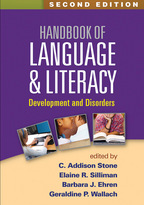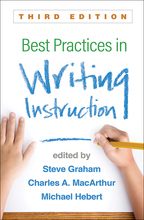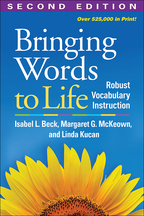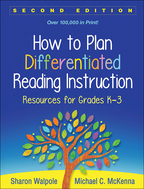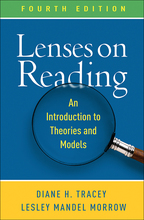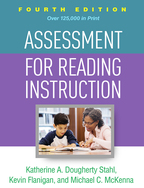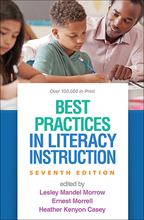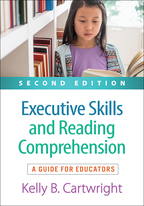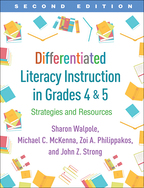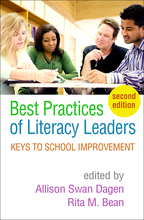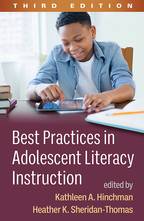Handbook of Language and Literacy
Second Edition
Development and Disorders
Edited by C. Addison Stone, Elaine R. Silliman, Barbara J. Ehren, and Geraldine P. Wallach
HardcoverPaperbacke-bookprint + e-book
Hardcover
orderSeptember 24, 2013
ISBN 9781462511853
Price: $108.00 715 Pages
Size: 7" x 10"
Paperback
orderMay 27, 2016
ISBN 9781462527489
Price: $72.00715 Pages
Size: 7" x 10"
“This handbook provides an extensive resource in all aspects of typical and atypical literacy development....Practitioners, researchers, and students in the fields of language science and disorders, literacy, speech–language pathology, special education, and educational psychology especially will benefit from the comprehensive examination of how language-related processes integrate with literacy instruction....Covers all aspects of literacy....It would be of great value to college and university departments and reference sections.”

—Education Libraries (on the first edition)
“Challenges the literacy community to rethink the meaning of difference, particularly as it relates to students' language and literacy acquisition in U.S. public schools....Provides insights into the politics of difference [and] helps us to recast our vision of effective instruction for atypical language and literacy learners....The Handbook has important messages for literacy teacher educators.”

—Reading Research Quarterly (on the first edition)
“This second edition of the Handbook of Language and Literacy is a timely follow-up to the well-received first edition. The contributors provide a welcome balance of researchers and practitioners. The book integrates theoretical and practical issues in both spoken and written language and their relationships to literacy learning, including second-language learning. Covering both typical development and disorders in the same handbook makes this an ideal text for programs in general and special education; language sciences; and psychology. My graduate students lit up with enthusiasm when I shared this volume with them.”

—Virginia W. Berninger, PhD, Department of Educational Psychology, University of Washington
“A rerun is rarely better than the first run, but the second edition of the Handbook of Language and Literacy surpasses a very good first showing by a country mile. I appreciate the comprehensive coverage provided by the contributing authors, especially their attention to new topics such as digital literacy, RTI, interdisciplinary literacy, and ELL instruction.”

—Steve Graham, EdD, Warner Professor, Mary Lou Fulton Teachers College, Arizona State University
“The volume provides an exceptionally broad and thorough review of current research concerning the theoretical, methodological, and service delivery issues involved in treating individuals with language and literacy challenges. The impressive group of contributors represents the wide range of disciplines with interest in these individuals. The editors have produced a seminal reference that will be indispensable for professionals in the field.”

—Alan Kamhi, PhD, Department of Communication Sciences and Disorders, University of North Carolina at Greensboro
“A state-of-the-art resource for educators who recognize the power and potential of an interdisciplinary approach to language development and literacy learning, this handbook has been a trusted source since its original publication. Cutting-edge topics in the second edition include digital literacy, disciplinary literacy, RTI, and second-language acquisition, all carefully contextualized for 21st-century educators and learners. This is an important text for graduate-level education courses and a 'must' for the preparation of reading specialists, reading teachers, and literacy coaches. Understanding the critical relationship between language and literacy is the only path to effective reading instruction and intervention.”

—Barbara A. Marinak, PhD, School of Education and Human Services, Mount St. Mary's University
—Education Libraries (on the first edition)
“Challenges the literacy community to rethink the meaning of difference, particularly as it relates to students' language and literacy acquisition in U.S. public schools....Provides insights into the politics of difference [and] helps us to recast our vision of effective instruction for atypical language and literacy learners....The Handbook has important messages for literacy teacher educators.”
—Reading Research Quarterly (on the first edition)
“This second edition of the Handbook of Language and Literacy is a timely follow-up to the well-received first edition. The contributors provide a welcome balance of researchers and practitioners. The book integrates theoretical and practical issues in both spoken and written language and their relationships to literacy learning, including second-language learning. Covering both typical development and disorders in the same handbook makes this an ideal text for programs in general and special education; language sciences; and psychology. My graduate students lit up with enthusiasm when I shared this volume with them.”
—Virginia W. Berninger, PhD, Department of Educational Psychology, University of Washington
“A rerun is rarely better than the first run, but the second edition of the Handbook of Language and Literacy surpasses a very good first showing by a country mile. I appreciate the comprehensive coverage provided by the contributing authors, especially their attention to new topics such as digital literacy, RTI, interdisciplinary literacy, and ELL instruction.”
—Steve Graham, EdD, Warner Professor, Mary Lou Fulton Teachers College, Arizona State University
“The volume provides an exceptionally broad and thorough review of current research concerning the theoretical, methodological, and service delivery issues involved in treating individuals with language and literacy challenges. The impressive group of contributors represents the wide range of disciplines with interest in these individuals. The editors have produced a seminal reference that will be indispensable for professionals in the field.”
—Alan Kamhi, PhD, Department of Communication Sciences and Disorders, University of North Carolina at Greensboro
“A state-of-the-art resource for educators who recognize the power and potential of an interdisciplinary approach to language development and literacy learning, this handbook has been a trusted source since its original publication. Cutting-edge topics in the second edition include digital literacy, disciplinary literacy, RTI, and second-language acquisition, all carefully contextualized for 21st-century educators and learners. This is an important text for graduate-level education courses and a 'must' for the preparation of reading specialists, reading teachers, and literacy coaches. Understanding the critical relationship between language and literacy is the only path to effective reading instruction and intervention.”
—Barbara A. Marinak, PhD, School of Education and Human Services, Mount St. Mary's University

